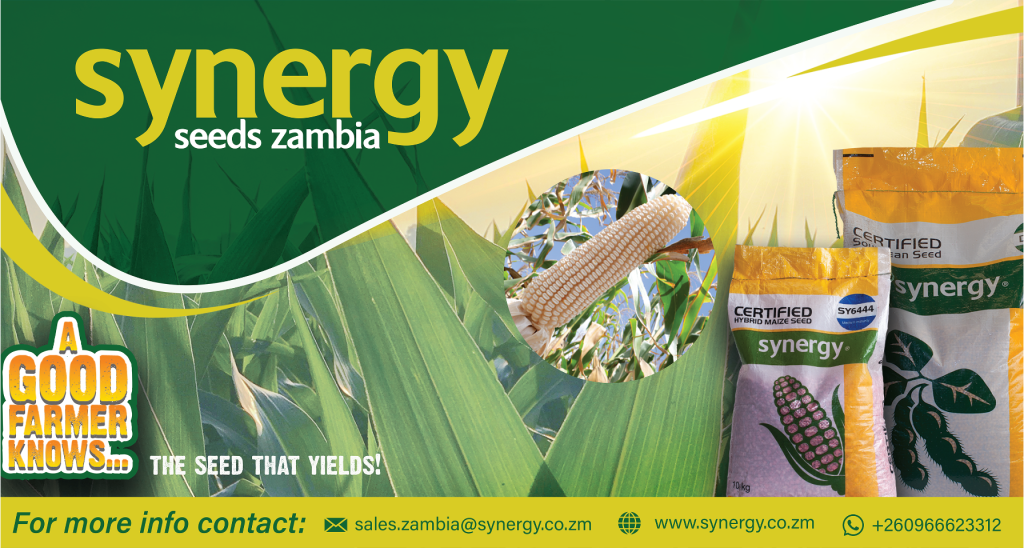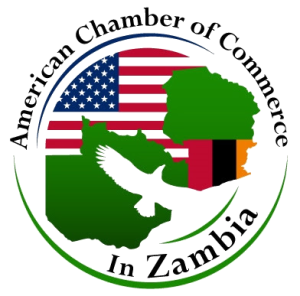
Synergy Seeds Company Overview
The seed industry in Zambia is a vital component of the country’s agribusiness. The seed industry plays a crucial role by providing farmers with high-quality seeds, resulting in increased crop yields and improved food security.
Synergy Seeds is a Zambian owned seed company, and we are leaders in seed breeding, production, and marketing of robust maize hybrids, soya beans and wheat seeds. Our block buster varieties and hybrids are locally bred and as such suitable for all the three agro ecological regions of Zambia. Synergy Seeds testing laboratory is accredited and mandated by SCCI to ensure that we offer quality seeds to our customers “Quality in every bag”.
We have a geographical footprint across the country and distribute our seeds through a channel of over 300 agro dealers/stockists. Farmers can access our products anywhere in the country at the recommended retail price.
In bridging the knowledge gap, our sales and marketing team dotted across the country offer technical support, to enable farmers attain the much-desired yields.
Our Maize hybrids in the medium maturity range include SY 6444, SY 6250, SY 6050 and MRI 624 whereas the early maturity range include SY 5944, SY 5054, MRI 514. SY4450 and SY 4052 which perform extremely well in low rainfall areas.
On the legumes, we have the mighty Dina soya beans seed, a 4.5MTs per Ha high yielding variety with excellent tolerance to shattering and acidic soils, high protein, and oil content.
Our wheat varieties; MRI 843, MRI 875, and SST 884 average 9MTs per Ha with good baking quality and tolerant to diseases.

Agribusiness industry overview
The agribusiness industry in Zambia is important to the country’s economy contributing to the Gross Domestic Product (GDP) and Export earnings. However, the sectors growth in the recent past has been inconsistent, limiting its contribution to the national economy.
Zambia is a seed production hub for most local, regional and multinational seed companies due to its location, favourable weather pattern, and cost effectiveness resulting from the various policy and human capital capacities developed over time. Seed is produced for local, regional and global trade. Therefore, seed is always produced beyond the local requirements.
The Zambian agribusiness industry is marked by a focus on maize as the country’s staple crop, with potential for growth in other cash crops and livestock production, though challenges remain due to weather fluctuations, inflation pressures, and the need for improved agricultural practices to maximize productivity; the sector is expected to see robust growth in grains, particularly corn and soya beans, despite facing potential setbacks from drought, while sugar production is also projected to increase due to mill process improvements. The drought has had a toll on electricity generation impacting farmers on irrigation and the industry players involved in value addition.
While most of the Zambia’s grain production comes from low yield small-holder farmers, Zambia produces surplus grain in a normal season. Zambian farmers’ low yields are largely due to continued use of recycled seed, non-mechanization, and inadequate financing; lack of awareness of improved farming practices; and interventions that have undermined the development of predictable or commercially sustainable commodities. As Zambia largely depends on rain-fed agriculture, with limited pesticide use, yields are highly vulnerable to increasingly frequent climate change-induced weather extremes, including floods and drought, and pest infestations.
Challenges faced around policy/regulation in the industry
The Zambian agribusiness industry has undergone structural changes in the recent past. The government of Zambia has played a crucial role in the development of the industry by implementing policies and regulations aimed at improving agricultural productivity and food security. One such program links all the farmers that obtain input under the Farmer Input Support Programme (FISP) to the Food Reserve Agency as grain-off takers. Furthermore, the introduction of the Sustainable Agriculture Financing Facility (SAFF), a program that provides financial support to farmers; the program’s goal is to improve agricultural sustainability and productivity. Through the acquisition of finance from private institutions, farmers can buy equipment and invest in better farming practices, thereby increasing crop yields.
Zambia has a well-regulated seed industry which makes the country a hub for both local and trans-boundary seed trade. The Seed Control and Certification Institute (SCCI) is the department under the Ministry of Agriculture that oversees the affairs of seed regulation. The Institute is a centre of excellence for all seed services in Zambia and the authority is accredited to the International Seed Testing Association (ISTA). This accreditation entails that test procedures applied conform to international recognition; certification procedures are therefore internationally recognized facilitating seed exports from Zambia.
Opportunities for growth in the industry
Zambia is part of regional bodies such as the Common Market for East and Southern Africa (COMESA) and the Southern Africa Development Community (SADC), that promote regional trade. With increased demand for quality seed and commodity in the region and beyond, the country has an established market of its agricultural products. This is a huge opportunity for the industry for market expansion.

Zambia has vast unutilised arable land and ample water resources but has invested little in developing irrigation systems or mechanized production. There are significant opportunities to develop irrigation systems, open more land for commercial farming and invest in value addition. The government is making significant strides in the establishment of farm schemes across the country, investing in the construction of dams and actively promoting the development of irrigation systems aiming to increase access to irrigation for farmers and combat the effects of climate change by enabling all year-round crop production.
Furthermore, we have witnessed farmland expansion by the Zambia National Service, Zambia Correctional Service and private business entities. This presents an opportunity for increased uptake of locally produced seed.
Synergy‘s role in the industry’s growth
Our role as Synergy is to build on the successes, we have gained overtime and continue to leverage on growth prospects, focus on product development and innovation, and leverage on our digital platforms to enhance extension support which is critical to scaling up production and bridging knowledge gaps especially with small holder farmers.
As more farmlands are being opened for agriculture production, Synergy has continued to expand its sales and distribution channels to reach more customers by taking the seed to the farmers doorstep. Furthermore, Synergy has continued collaborating with local and international partners to access the latest seed technology, adoption of modern and efficient seed multiplication methods, this will fast track the release of climate smart hybrids and enhance production efficiencies.
Our digital platform has become a powerful tool in bridging the gap between Synergy Seeds and our diverse audience. By creating engaging, relatable, and educational content, we’ve managed to capture the attention of a wide range of individuals from seasoned farmers to curious beginners and even those outside the farming community.
Through this platform, we’ve built a two-way communication channel that allows us to interact directly with farmers and potential customers. This interaction provides invaluable feedback on our products, answers critical farming questions, which helps guide farmers on suitable hybrids, crop protection solutions, and more. Additionally, our digital platform serves as a launchpad for new products. Our strategy of blending education, entertaining, and engaging content has allowed us to build a dynamic community, grow our fan base, and foster loyalty among farmers and non-farmers alike and has made farming look and sound fun.
